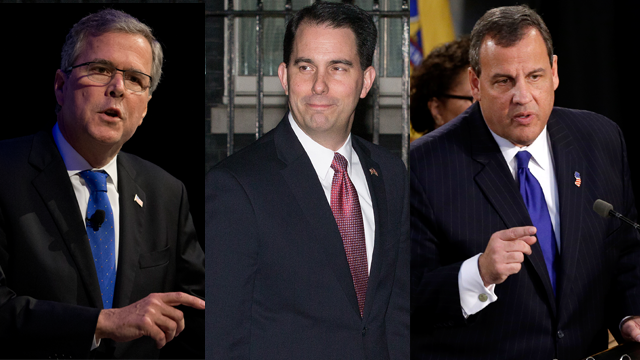BillMoyers.com is proud to collaborate with EveryVoice on a series of op-eds featuring ideas from a variety of viewpoints for making our democracy one that is truly of, by and for the people. Discover more ways to fight back against our broken campaign finance system. It’s a fight we can win.

With all of this prospective candidate fundraising going on, some are asking “When do the candidate contribution limits kick in?” The answer might surprise even astute political observers, because reality doesn’t seem to correspond with the laws on the books.
Federal law requires an individual who is “testing the waters” of candidacy to pay for those activities with funds raised in compliance with the candidate contribution restrictions — no individual contributions above $2,700, no corporate or labor union funds. “Testing the waters” means activity “undertaken to determine whether the individual should become a candidate,” including, for example, travel to see if there is sufficient support for one’s candidacy.
Not only are the early 2016 presidential election frontrunners claiming they’re not yet candidates, nearly all of them are denying that they’re even “testing the waters.” Of the nearly 20 prospective presidential candidates I profile in a recently-published white paper on this subject, only Senator Lindsey Graham (R-SC) and former Senator Jim Webb (D-VA) appear to be complying with the federal campaign finance law requirement that “testing the waters” activities be paid for with candidate-permissible funds.
More than a dozen others — including Jeb Bush, Bobby Jindal, Carly Fiorina, Jim Webb, Marco Rubio, Martin O’Malley, Mike Huckabee, Rick Perry, Rick Santorum, Scott Walker and Chris Christie — are actively and openly raising and spending funds outside the candidate contribution limits, through super PACs, 527 organizations, multicandidate PACs and 501(c)(4) groups, to engage in activities that certainly appear to be for the purpose of determining whether the individual should become a candidate. These prospective 2016 candidates claim they’re not “testing the waters,” but they look more than a little bit wet.
Why does this matter? For more than 100 years, federal law has restricted contributions to candidates and the Supreme Court has upheld such restrictions as vital to reducing the threat of corruption that results from large contributions. The Court explained in Buckley v. Valeo, for example: “To the extent that large contributions are given to secure a political quid pro quo from current and potential office holders, the integrity of our system of representative democracy is undermined.”
The FEC seemed to understand this during the 1970s-80s, when the commission regularly pushed back against prospective candidate efforts to evade federal law. Through a series of Advisory Opinions during the commission’s early years, it made clear that many of the activities being engaged in today by prospective 2016 candidates needed to be paid for with funds raised under the candidate limits.
The FEC is responsible for enforcing the contribution limits for “testing the waters” activities and has the capacity to conduct investigations of prospective candidates; to determine, for example, precisely what activities have been paid for by prospective candidates and their organizations, and whether “testing the waters” activities have actually been paid for with funds raised under the candidate limits, as required by law.
While it may be true that many politicians at one time or another think about running for president, no one has ever suggested that mere aspirations and blue sky thoughts are the same as “testing the waters.” And it is also true that it is sometimes difficult to find the line where aspirations become the intention and purpose to undertake specific activity. But in order for the corruption-preventing candidate contribution restrictions to be effective in this new age of unlimited super PAC fundraising and spending, some difficult lines will have to be drawn.
The FEC struggled with such line-drawing in the 1970s-80s. And though Presidents Reagan and George H.W. Bush got away with pushing the “testing the waters” boundaries, their boundary-pushing took place prior to the midterm elections and involved limited contributions. Jeb Bush’s reported plan to raise $100 million in unlimited super PAC contributions during the first quarter of this year — after the midterm election, during the 2016 presidential election cycle — is not merely a difference in degree; it’s a difference in kind.
Today, even the modest boundaries set by the FEC in the 1970s-80s are being flouted by prospective 2016 presidential candidates and the commission appears to be doing nothing in response. The FEC needs to step up its enforcement of the federal law requirement that “testing the waters” activities be paid for with candidate-permissible funds.
But even if the FEC refuses to do its job, journalists and voters can and should hold prospective 2016 presidential candidates accountable for these actions. Prospective candidates should be asked, point blank, whether they are raising and spending funds for the purpose of determining whether they are going to run for president. If they deny that they are “testing the waters” of a candidacy, they should be asked why they are traveling repeatedly to Iowa and New Hampshire, recruiting bundlers and major donors, and hiring staff for national political operations.
Prospective candidates should be required to explain their activities in a manner that passes the smell test. Just because the FEC may ignore violations and indulge abuses of the law does not mean that voters or journalists should do the same. Honesty is not too much to ask of individuals seeking to become our next president. It’s time to end this tired charade. It’s time for prospective presidential candidates to obey the law. And it’s time for voters to hold accountable those prospective candidates who do not.


